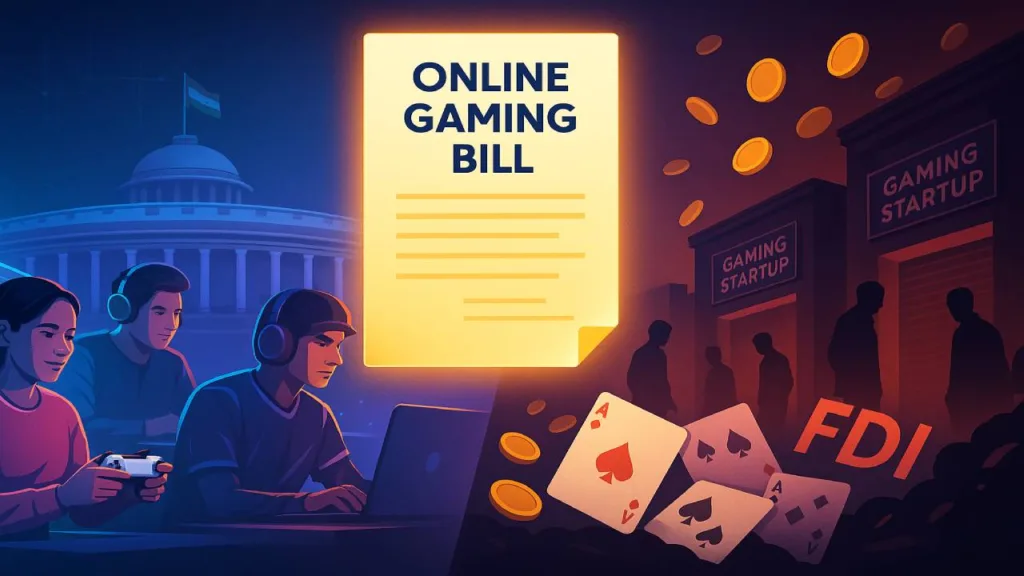
The online gaming bill, passed by the Lok Sabha could potentially threaten the future of over 2,000 startups and jeopardise the incoming FDI. Continue reading to understand how.
Table of Contents
What is the Online Gaming Bill?
On Wednesday, the Lok Sabha passed the draft for the Promotion and Regulation of Online Gaming Bill, according to which all online betting and gambling activities would be outright banned, starting from online fantasy sports to online gambling, including card games like Poker, Rummy, etc., and online lotteries, according to PTI. To put it bluntly, games involving financial stakes, endorsing addiction and monetary losses and teenage suicide.
Additionally, the online gaming bill prohibits banks and other financial institutions from processing or facilitating related transactions and bans advertisements and sponsorships endorsing such games.
However, it has been clarified by the Government that social games and esports will continue to be legal, with subscription-based access permitted but no guarantee of financial gains.
Any person violating the provisions of this bill will face imprisonment for a maximum of three years or a fine of up to Rs 1 Crore or both, depending on the circumstances.
Now, this decision made by the Central Government could either do wonders for the economy or go absolutely south.
Here’s why- you need to understand that online gaming is a legal job-creating industry that brings in an annual revenue of over 31,000 Crores and has a valuation of more than 2,00,000 Crores. Apart from that, it injects more than Rs. 20,000 Crore in the Indian economy annually in the form of direct and indirect taxes and is only projected to grow at a 20% rate compounded annually (CAGR), doubling and skyrocketing by 2028.
 Is Indian Judiciary System Still Confusing in 2025? Read This. →
Is Indian Judiciary System Still Confusing in 2025? Read This. →Knowing this, if this bill is passed and real money games are banned, it will lead to an alarming drop in the employment level of the country, and below are the stats to back this:
As of 2024, there are over 50 Crore gamers in India, that’s approximately a third of the entire population, which is a massive. In terms of finances, this sector generates more than 2,00,000 direct and indirect jobs, and has received more than 25,000 Crore of Foreign Direct Investment (FDI) up until June of 2022.
Looking at these figures, you can imagine the impact this bill would have once it’s been passed by the Rajya Sabha.
Pros of the Online Gaming Bill:
- Boosts Creative Economy: Positions India as a global hub for gaming exports, innovation, and jobs.
- Empowers Youth: Encourages skill-based gaming and e-sports participation.
- Ensures Safety: Protects families from predatory real-money gaming.
- Global Leadership: Strengthens India’s role in responsible gaming and digital policy.
The cons of the bill:
- Drop in the employment rates and a risk to the industry: Over 2,000 gaming startups and more than 2 Lakh IT, AI, and design jobs could be affected, once the bill is passed.
- Foreign Direct Investment threat: The bill could wipe 6 billion dollars out of the economy in terms of investments and push users to resume their activities through offshore platforms.
- Revenue and Tax Loss: As stated earlier, India could lose around Rs 20,000 crore yearly from GST and indirect taxes. Online gaming is currently subject to 28% GST and 30% tax on net winnings.
- Addiction: Banning online gaming may push users to unregulated platforms, increasing the potential for illegal activities.
- National Security Risks: Offshore platforms usually facilitate money laundering, terror financing, and data theft, among other illegal activities that might expose the country to danger.
- Ecosystem Collapse: Around Rs 7,000 Crore spent annually on ads, data centres, sponsorships, and cybersecurity could vanish, affecting India’s gaming vision.
 Big Update! Banglarbhumi 2025: Land Records Now Just a Click Away! →
Big Update! Banglarbhumi 2025: Land Records Now Just a Click Away! →



